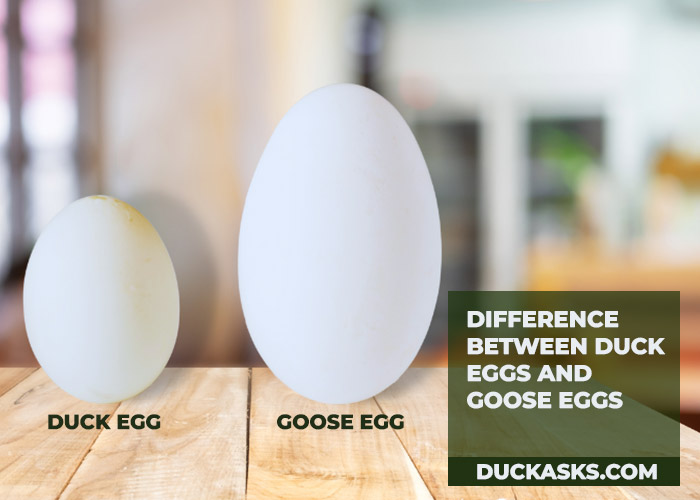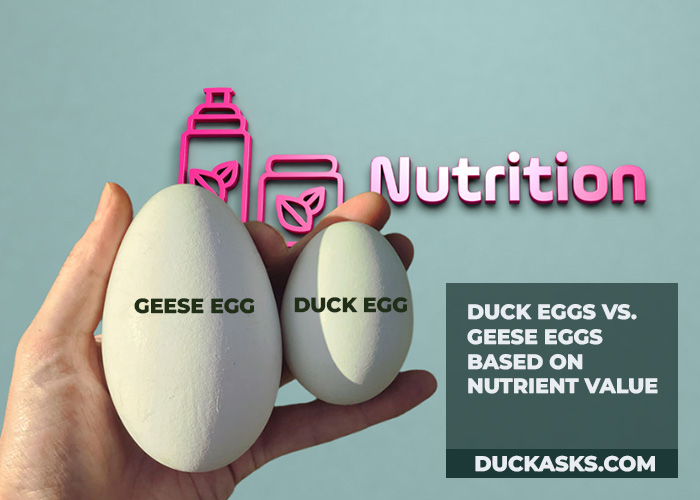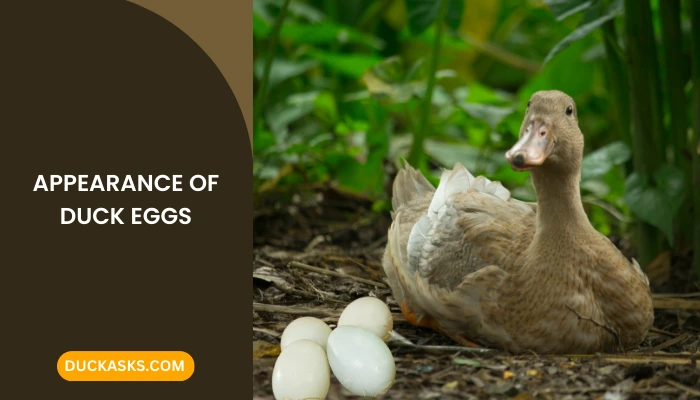Are Duck Eggs And Geese Eggs Similar?
The question, “are duck eggs and geese eggs similar” is a common one among those who are interested in cooking, farming, or simply learning about different types of eggs.
While both duck eggs and geese eggs come from birds that belong to the same family (Anatidae), several differences between them set them apart.
For starters, duck eggs are generally smaller in size and have a more delicate, thin shell compared to geese eggs, which are larger and have a thicker, more robust shell.
Apart from that, there are other primary differences too that can help you determine which one is better for your overall health. Below I have briefly discussed the differences between duck eggs and geese eggs based on their health benefits, health risks, price, taste, etc.
Related articles about duck breeding
What Is the Difference Between Duck Eggs and Goose Eggs?
Duck eggs and goose eggs are similar in many ways, as they are both laid by poultry birds. However, there are a few key differences between the two:
01. Size
Goose eggs are larger than duck eggs, with an average size of about 3-4 times the size of a large chicken egg.

02. Shell Thickness
The shell thickness of goose eggs is thicker than duck eggs, which makes them more resistant to breaking.
03. Yolk-to-white Ratio
Goose eggs have a higher yolk-to-white ratio than duck eggs, which means that the yolk takes up a larger proportion of the egg.
04. Taste
Some people belive that geese eggs are similar to chicken eggs in terms of richer flavor while others belive that geese eggs taste bland and little bit funky. On the other hand, duck egg tastes more intense and creamier.
05. Texture
The whites of goose eggs are firmer than those of duck eggs, which can make them better for cooking dishes that require stiff peaks, such as meringues.
06. Usage
Because of their larger size and thicker shells, goose eggs are not as commonly used in cooking as duck eggs. However, they can be used in any recipe that calls for chicken eggs and is particularly well-suited for dishes that require a lot of eggs, such as quiches and frittatas.
On the other hand, duck eggs are more commonly used in baking and are prized for their rich, creamy yolks and firm whites.
07. Availability
Here, duck eggs are more widely available than geese eggs, as ducks are more commonly kept as backyard pets or raised for meat and eggs. Geese are less commonly kept for these purposes, so their eggs may be harder to find.
08. Price
Due to their larger size and lower availability, geese eggs tend to be more expensive than duck eggs.
To conclude, the main differences between duck and goose eggs are their size, shell thickness, yolk-to-white ratio, and texture.
Both types of eggs can be used in a variety of recipes, but they may have slightly different properties and may be better suited for certain dishes over others.
Health Benefits of Duck Eggs
Duck eggs have a plethora of health benefits that make them a great alternative to chicken eggs. One of the main benefits of duck eggs is their higher nutrient content.
These eggs are higher in protein, vitamin B12, and iron compared to chicken eggs.

They also contain more selenium, an important mineral for the immune system and the production of antioxidants.
In addition to their higher nutrient content, duck eggs have several other health benefits, such as:
- They are a good source of choline, a nutrient that is important for brain function and the production of neurotransmitters.
- Duck eggs also contain a higher amount of omega-3 fatty acids, which can help to reduce inflammation and lower the risk of heart disease.
- These eggs are also a good choice for those who are sensitive to chicken eggs. Many people who are allergic to chicken eggs can tolerate duck eggs without any problems. This is because the proteins in duck eggs are different from those in chicken eggs, which may make them less allergenic.
- Duck eggs are also a good choice for those who are trying to lose weight. They are lower in calories and fat compared to chicken eggs, which can help to reduce the risk of weight gain. They also contain a higher amount of protein, which can help to keep you feeling full and satisfied after eating.
Overall, duck eggs are a nutritious and healthy alternative to chicken eggs. They are a good source of protein, vitamins, minerals, and omega-3 fatty acids and may be less allergenic for some people.
If you are looking to improve your health and nutrition, consider adding duck eggs to your diet.
Health Benefits of Geese Eggs
Geese eggs are a nutritious and healthy food option that offers a range of benefits for the body. One of the main benefits of geese eggs is their high protein content.
Each egg contains around 6 grams of protein, which is important for building and repairing tissues in the body.

They also contain essential amino acids, which are the building blocks of proteins and are necessary for proper growth and development.
In addition to their nutrient content, geese’ eggs have several other health benefits:
- These nutrients are important for maintaining good health and preventing various health problems. For example, vitamin A helps to maintain healthy eyesight and skin, while calcium is essential for strong bones and teeth.
- Geese eggs are a good source of vitamins and minerals. They contain vitamins A, D, and E, as well as calcium, iron, and zinc.
- They are a low-calorie food, making them a good choice for people who are trying to lose weight. Moreover, they are also low in cholesterol and saturated fat, making them heart-healthy food.
- Geese eggs also have anti-inflammatory properties, which may help reduce the risk of certain diseases such as diabetes and heart disease.
- They may also positively affect the immune system, helping improve overall health and well-being.
Overall, geese eggs are a nutritious and healthy food option that offers a range of benefits for the body. They are high in protein, vitamins, and minerals and are low in calories, cholesterol, and saturated fat.
As geese eggs have anti-inflammatory properties and improve immune function, they can be a valuable addition to any healthy diet.
Duck Eggs vs. Geese Eggs Based on Nutrient Value
Here I have curated a nutrient chart on Duck eggs vs. geese eggs so you can comprehend the differences and subtle similarities better. Also, for your better understanding, I clarified the chart comprehensively.
| Nutrient | Duck Eggs | Geese Eggs |
|---|---|---|
| Protein (g) | 8.97 | 19.97 |
| Fat (g) | 9.64 | 19.11 |
| Cholesterol (mg) | 619 | 1230 |
| Vitamin A (mcg) | 135.8 | 269.3 |
| Vitamin B12 (mcg) | 3.78 | 7.34 |
| Vitamin D (DV) | 17% | 17% |
| Calcium (mg) | 4.8 | 86.4 |
| Iron (mg) | 2.69 | 5.24 |
When it comes to nutrient value, both duck and geese eggs offer a variety of beneficial nutrients.

However, there are some differences in the amounts of certain nutrients found in each type of egg such as,
01. Protein Content
Geese eggs contain slightly more protein than duck eggs, with 19.97 grams per egg compared to 8.97 grams per egg. This may make geese eggs a better choice for those looking to increase their protein intake.
02. Fat Content
Geese eggs have significantly more fat than duck eggs, with 19.11 grams per egg compared to 9.64 grams per egg. This may make geese eggs less suitable for those trying to reduce their fat intake.
03. Cholesterol
Both duck and geese eggs contain high amounts of cholesterol, with duck eggs containing 619 mg per egg and geese eggs containing 1230 mg per egg. It’s important to note that cholesterol intake should be limited for those at risk of heart disease or high cholesterol.
04. Vitamin A
Well, both duck and geese eggs are good sources of vitamin A, with duck eggs containing 135.8mcg per egg and geese eggs containing 269.3mcg per egg. Worth mentioning vitamin A is important for eye health and immune function.
05. Vitamin B12
Interestingly duck eggs and geese eggs are both amazing, reliable sources of vitamin B12, with duck eggs containing 3.78 mcg per egg and geese eggs containing 7.34 mcg per egg.
Moreover, vitamin B12 is important for nerve function and the production of red blood cells.
06. Vitamin D
Both duck and geese eggs contain relatively small and similar amounts. They contain 17% DV of Vitamin D.Let’s not forget that vitamin D is important for bone health and immune function.
07. Calcium
They are both effective in supplying the necessary calcium contents you need, with duck eggs containing 4.8 mg per egg and geese eggs containing 86.4 mg per egg. Not to mention, calcium is important for bone health and muscle function.
08. Iron
Here duck egg possess 2.69mg iron per egg whereas geese eggs contain 5.24mg iron per egg. In case you dont know, iron is a mineral that your body requires for growth and development. Also, your body incorporates iron to produce hemoglobin and myoglobin.
These are necessary proteins that carry oxygen from the lungs to all parts of the body and provides oxygen to muscles, respectively.
Long story short, both duck and geese eggs offer a variety of beneficial nutrients. However, it’s important to consider the differences in the amounts of certain nutrients when deciding which type of egg to include in your diet.
Can You Eat Duck Eggs and Goose Eggs?
Yes, both duck and goose eggs are edible and can be eaten in various dishes. Let’s have a look!

Duck Eggs
As we have mentioned before, they have a slightly richer flavor and a higher fat content than chicken eggs, which can make them more flavorful and creamy when used in cooking. Duck eggs are commonly used in baking and can also be fried, scrambled, or used in dishes like quiches or frittatas.
They are also a popular choice for making noodles and dumplings, as their higher protein content helps the dough hold together better.
Geese Eggs
They are even larger than duck eggs, with thicker and more brittle shells. Geese have a more distinct flavor than chicken eggs, with a slightly gamier taste and a creamier yolk. Like duck eggs, they are commonly used in baking and can also be fried or scrambled.
Besides, these eggs are also often used in dishes like omelets or quiches, as their larger size means they can be used in place of multiple chicken eggs.
Additionally, duck eggs have a higher fat content, which makes them ideal for baking and cooking, while geese eggs have a lower fat content, making them better suited for boiling and poaching. Ultimately, whether duck eggs and geese eggs are similar depends on what characteristics you are comparing them to.
Both duck and goose eggs can be found at farmers’ markets or specialty stores, and they are often more expensive than chicken eggs due to their smaller production and demand.
These eggs are considered to be more sustainable and ethical options, as ducks and geese are often raised on small farms and are not subjected to the same intensive farming practices as chickens.
How Big Is a Goose Egg Compared to a Duck Egg?
Well, a goose egg is generally larger than a duck egg. On average, a goose egg is about 2-3 times the size of a duck egg.
The size of a goose egg can range from about 3-5 inches in length and 2-3 inches in width, while the size of a duck egg is usually about 2-3 inches in length and 1-2 inches in width.
End Quote
So, coming back to your question, which was ‘are duck eggs and geese eggs similar” I want to conclude that duck eggs and geese are indeed similar in a few ways. Both are considered poultry eggs and are a source of numerous nutrients.
However, there are some significant differences as well as nuanced ones. Ultimately, whether duck eggs and geese eggs are similar depends on the specific characteristics being compared.
Image Credit: Canva.com/photos






